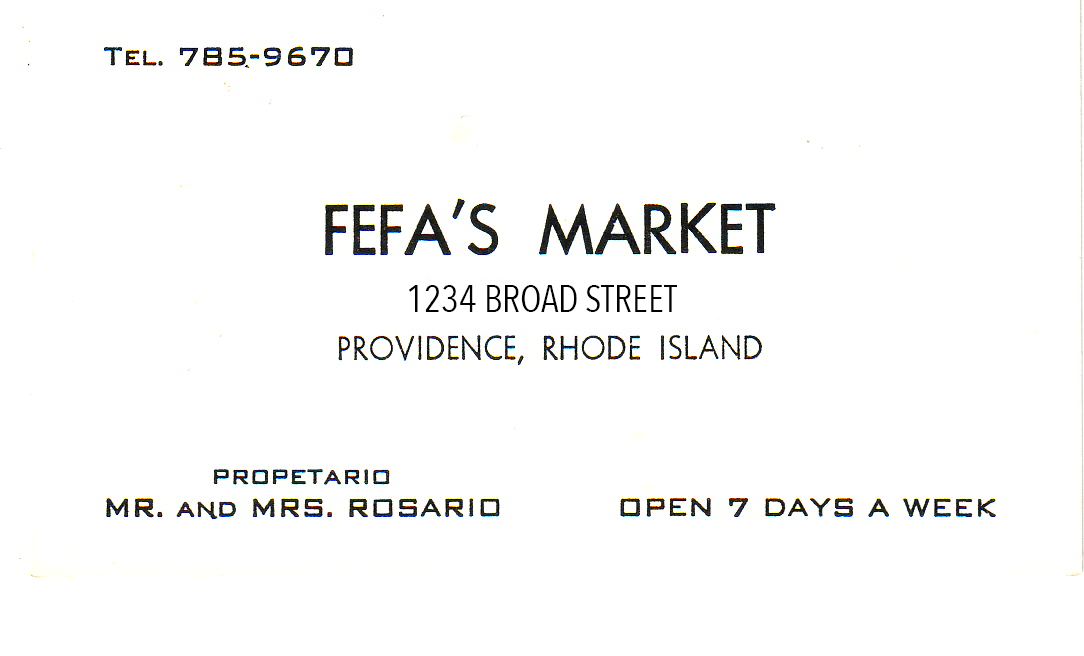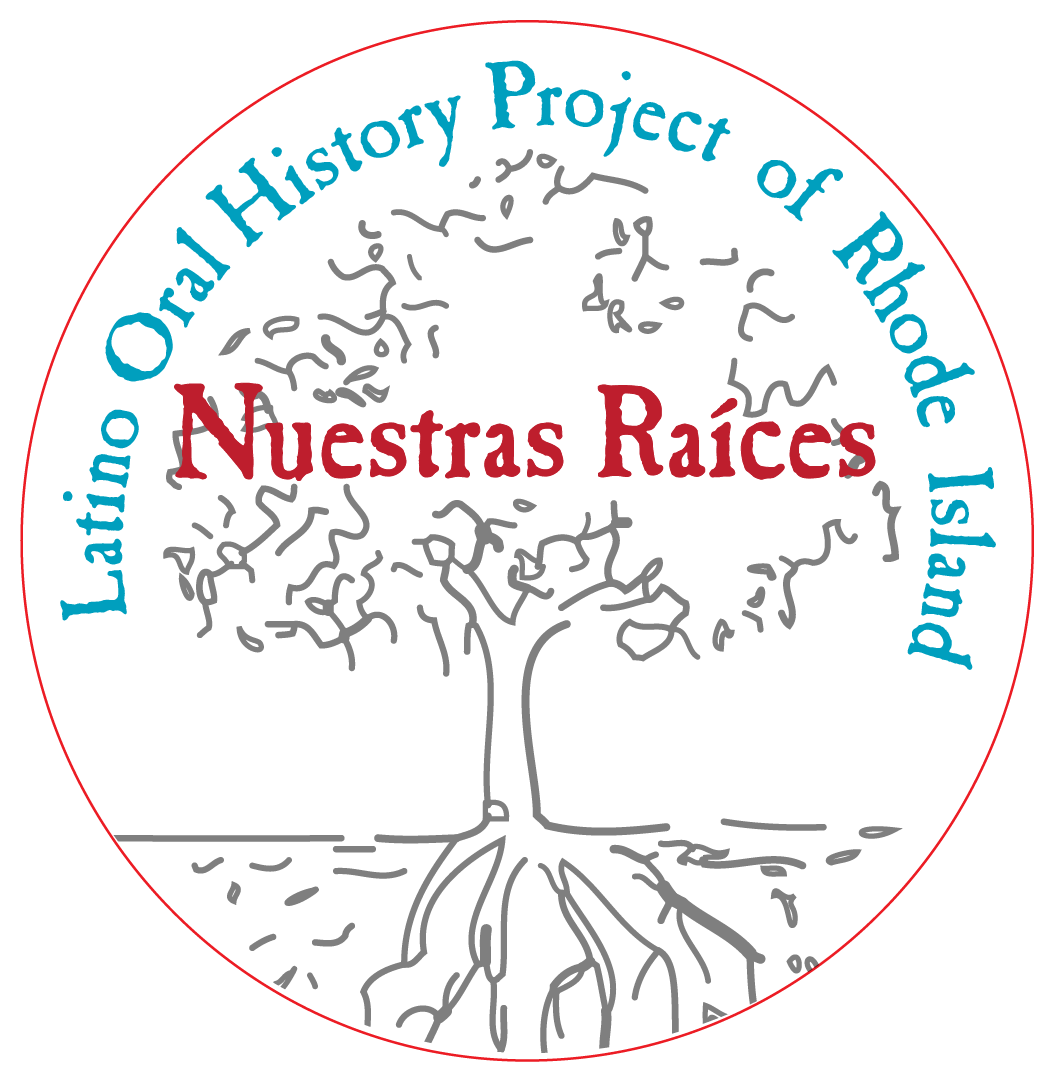Hover over the above image for a larger view …
By the mid-1960s, the Hispanic community in Providence had grown and we could not keep up with the many orders for food we were getting, so it was then that decided to open a bodega, a market on Broad Street — right on the corner of Broad and Baker. It was located across from the entrance to Roger Williams Park in Providence, where the laundromat is now. Doce-treinti-cuatro 1234 Broad Street. We called it Fefa's Market.
And then, not too much later, because my husband was a chef, we started to serve food inside the market, in the back corner. It became very popular especially for men who came to Rhode Island from the Dominican Republic and other Latin American countries, to work in the factories or textile mills (NOTE: Colombians and Guatemalans began to arrive in Rhode Island around 1964). Most came without their families, without their wives, and many told me they missed eating the familiar foods from home, and especially appreciated the fact that they could come to our place and not have to eat alone.
I remember, there was an americano that called my husband "Mr. Feefa." Ha! Yes, I would answer the telephone and he would say, "I want to speak to, eh, Feefa." And I would say, "Well, she's speaking." And he would say, "No, Mister Feefa." And other Americans, they would say "Feefa," instead of "Fefa!"
Later, we opened a second market on 516 Prairie Avenue, a few miles from the first market. We moved there to be closer to the growing Hispanic community. It was open seven days a week. We all worked very hard. My daughters worked there when they were not in school.
And then, not too much later, because my husband was a chef, we started to serve food inside the market, in the back corner. It became very popular especially for men who came to Rhode Island from the Dominican Republic and other Latin American countries, to work in the factories or textile mills (NOTE: Colombians and Guatemalans began to arrive in Rhode Island around 1964). Most came without their families, without their wives, and many told me they missed eating the familiar foods from home, and especially appreciated the fact that they could come to our place and not have to eat alone.
I remember, there was an americano that called my husband "Mr. Feefa." Ha! Yes, I would answer the telephone and he would say, "I want to speak to, eh, Feefa." And I would say, "Well, she's speaking." And he would say, "No, Mister Feefa." And other Americans, they would say "Feefa," instead of "Fefa!"
Later, we opened a second market on 516 Prairie Avenue, a few miles from the first market. We moved there to be closer to the growing Hispanic community. It was open seven days a week. We all worked very hard. My daughters worked there when they were not in school.
People knew exactly what time we would be returning, and they would be waiting there to get their things; a long line would be waiting for us when we arrived. Yeah, I remember, we used to have a little scale to measure items,the dried goods. Those who did not order things would come anyway to see what we had.
Doña Fefa
To this day, people who remember me from those days call me "Doña Fefa." Those families, their children and other relatives who came later to Rhode Island still see me and still remember how I brought them here.
Most of the people came here from the Dominican Republic around 1960, and by the mid-60s, while there were very few of us [Dominicans], we noticed people from other Spanish-speaking countries were coming to our bodega; many were living in Central Falls or other parts of Providence.
Most people still stayed in our home or found apartments to rent, but it was in the late 1960s and early 70s, when more and more of the Dominicans started buying houses. It was then that they would write to their families and friends, asking them to come join them in the United States. The Dominican community started slowing growing then, and they began to settle in homes off of Broad Street, and soon people started to open a few businesses in South Providence. Many did not have cars or driver's licenses, so having stores nearby where they could walk was important. Soon, you could see many Hispanic businesses on Broad Street. Today, it is still like that.
By the mid-to-late 1970s more and more Dominicans and other Hispanics began arriving in larger numbers. But, it was in 1978 when the dam broke open, because that was when Antonio Guzmán was elected President of the Dominican Republic and many people were afraid to stay in that country. There was a lot of poverty and the economy did not look hopeful in the Dominican Republic, so people wanted to leave.
Today, I feel like many Hispanic people treat me like I am somebody special. I guess I brought an awful lot of people together. See, we were such a small community here back then, and we took care of each other.
My husband was such a good man, he was so helpful to so many Hispanics. He would give you the shirt off of his back! He was also a great cook. On Sundays, he used to make a big tray of shrimp, or roast beef and other meals he learned to cook while working as a restaurant chef, and he would invite lots of people over to eat Sunday dinner with us. He especially like to serve lots of shrimp! Back then they were really cheap, and because he was a chef, we could buy a big box because he knew where to buy it wholesale. So he would make shrimp, pieces of roast beef, and he would make rice and beans, and a big salad.
The First Hispanic Social Workers
In those days, when people needed something, they would come to us. They knew we would help them. And we never felt we could ever turn anybody down. People would come to us for help in the middle of the night saying "No tengo dinero para pagar el gas, y ya me lo cortaron. Por favor..." I don't have money to pay my gas and they cut it, please..." Somehow, my husband knew how to go and turn the gas on so the people wouldn't have to be cold. That I remember. And they would come any time of the night, they would come knocking at the door seeking our help. And, as I said, we never felt we could ever say no to anybody.
My husband eventually started asking around to see if anyone could help the Hispanic people, especially those that were living in our house. And there was this priest, I think he had ties to Colombia; his name was Padre Rubba (The Rev. John Rubba). He was from Providence College. I remember he gave people beds, he gave people clothes. I was so grateful to him personally because he helped some of my cousins, you know, he got everything for my cousins, and for everybody who said they needed something. He would make a list of what was needed, then would call my husband, Tony, who would go get the items and bring them back to everybody.
First Life and then Death
After a few years of living in the United States, when a Dominican friend died, my husband and I had to go with the family to the funeral parlor; we went to Bell Funeral Home on Broad Street. We went to help interpret, but quickly realized that we had to teach the funeral director about Dominican customs, what to do when one of us died. We also helped raise money to send the body back home to be buried.
Pretty soon, people in Providence began to know me and my husband well, and so it was easy for me to go to a business owner and recommend someone for a job. I would even help people get their social security card. People trusted me and my husband, and they would help us in whatever way they could. Of course, it was easier back then because there were more jobs available.
When one of the people who was living in our house found a job, I would then ask for 15 dollars a week for room and board, no more than that, until they got settled in their job and were able to find their own apartment.
But, it was not always easy, it was a struggle for us and many other Hispanics, as well. Many people had to rely on one another for help. Many of the Dominicans and other Hispanics who had kids that spoke English, had to ask them to interpret when they went out.
I would even send my daughters to interpret for many of our friends who needed help while applying for their social security, trying to get a driver's license, and other things like that. Some people didn't know how to read even in Spanish, so my daughters helped with that, too. Many times, I would take the girls out of school and send them somewhere to interpret for our friends who needed help during business hours.
I am very proud of my daughters, Cecilia, Madeline and Miriam. They worked as hard as me and Tony to help many of the Hispanics who came to Providence. I know it was not easy.
I am very proud of my daughters, Cecilia, Madeline and Miriam. They worked as hard as me and Tony to help many of the Hispanics who came to Providence. I know it was not easy.
Comments:


